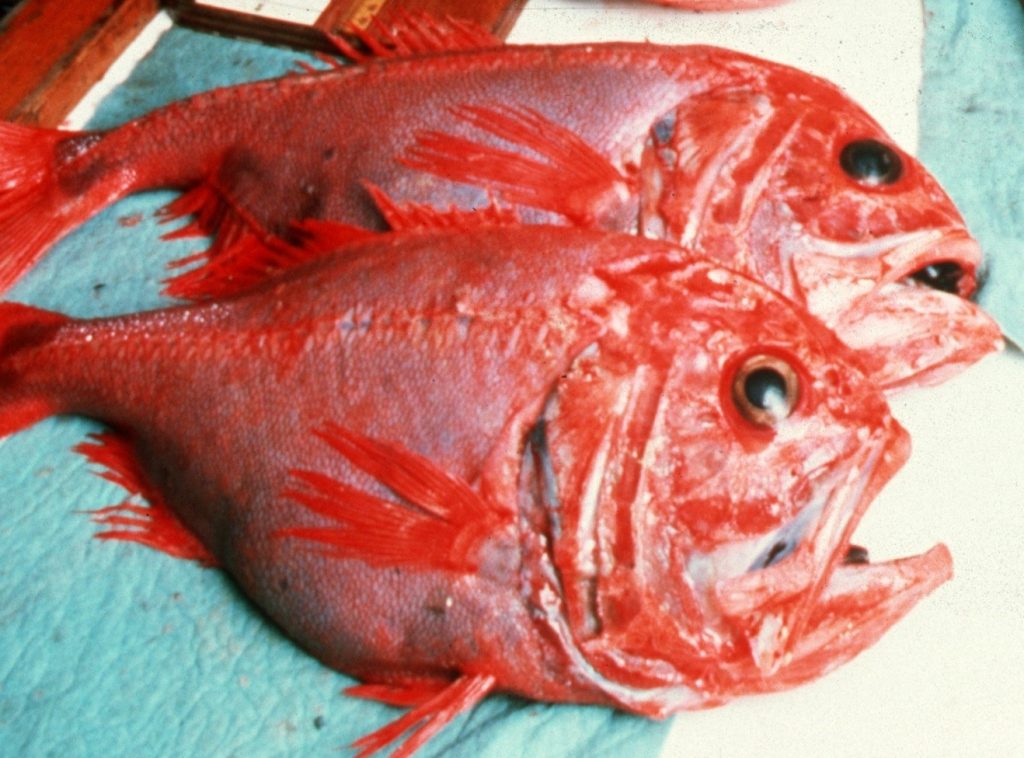
To listen to today’s reflection as a podcast, click here
In the late 1970s, commercial deep sea fishermen made an amazing discovery off the coast of Australia.
Nearly a mile beneath the surface there were vast schools of a large, reddish-orange species of fish. They were delicious. Their filets, which exuded almost no fishy smell or taste, delighted chefs.
From a marketing standpoint, there was just one problem. These fish were called slimeheads – not exactly the sort of name that launches a global fish-feasting frenzy. Someone proposed an alternative. Why not call them orange roughy?
In 1975, no one was eating orange roughy. Within 15 years, 90,000 tons were being consumed annually worldwide.
That’s when marine biologists began to make some alarming discoveries.
Orange roughy may live to be 200 years old. It takes them a long time to attain their average two-foot length. They also wait as long as 35 to 40 years to mate. A 2022 study revealed that the fish in 95% of the orange roughy stocks worldwide were reproducing at age 73 – which seems to indicate these fish prefer to hold off having kids until Medicare is able to pay the maternity bills.
Orange roughy tend to live solitary lives until spawning season, when they gather in enormous groups. That’s why they had eluded fishermen for so long.
Unfortunately, that’s also what makes their population vulnerable to a precipitous collapse: Deep-trawl fisheries capture them en masse before the mating process concludes.
There’s a reason you haven’t seen nearly as much orange roughy on restaurant menus or in the seafood department of your local grocery store in recent years. They’re almost all gone.
It’s estimated that fish-lovers consumed 90% of the world’s supply of orange roughy in less than 30 years. And because they are what ecologists call a fish of “very low resilience” – meaning it takes them an exceedingly long time to bounce back – we may never experience them in great numbers again.
Should we care about the demise of a fish that lives a mile below the surface of the ocean?
One of our Earth Day opportunities every year is the chance to reflect on our stewardship of the planet that we share with myriad other creatures.
Stewardship is not ownership. This is God’s world, not ours.
Stewardship is the notion that we’ve been called to tend the earth on God’s behalf – one of the original “standing orders” for the first humans (Genesis 2:15): “The LORD God took the man and put him in the Garden of Eden to work it and take care of it.” Alternative translations for that last verb include “keep it,” “watch over it,” “guard it,” “tend it,” “care for it,” and “keep it in order” – all of which imply the fulfillment of a trust given to us by our Creator.
But the earth seems so big, and the problems so overwhelming, that we hardly know where to start. Here are some possibilities:
Be alert and aware. Environmental stories rarely rate as “breaking news,” but every year we learn important new things about the challenges and opportunities of sustainability – how we can better care for the water, air, forests, animals, and natural resources that quite literally care for us.
If you love fish, choose to eat a resilient species. Tilapia, for instance. Tilapia stocks are rising around the world, and these mild-tasting, freshwater fish can thrive even in muddy ponds.
Pray. This may seem to be an odd recommendation. But stewardship is essentially a spiritual commitment, and prayer connects us with the Artist and Architect behind everything.
Soften your spirit. Behind much of Western history lies the conviction that the Earth is here for us. Orange roughy is just a big dumb fish, after all. Shouldn’t we be able to eat whatever we want?
But the more we cultivate a reverence for life – a profound respect for the value of every living thing – the more we will find ourselves becoming stewards of God’s best stuff instead of mere consumers.
After all, we don’t want to end up being the species most deserving of the name slimehead.
